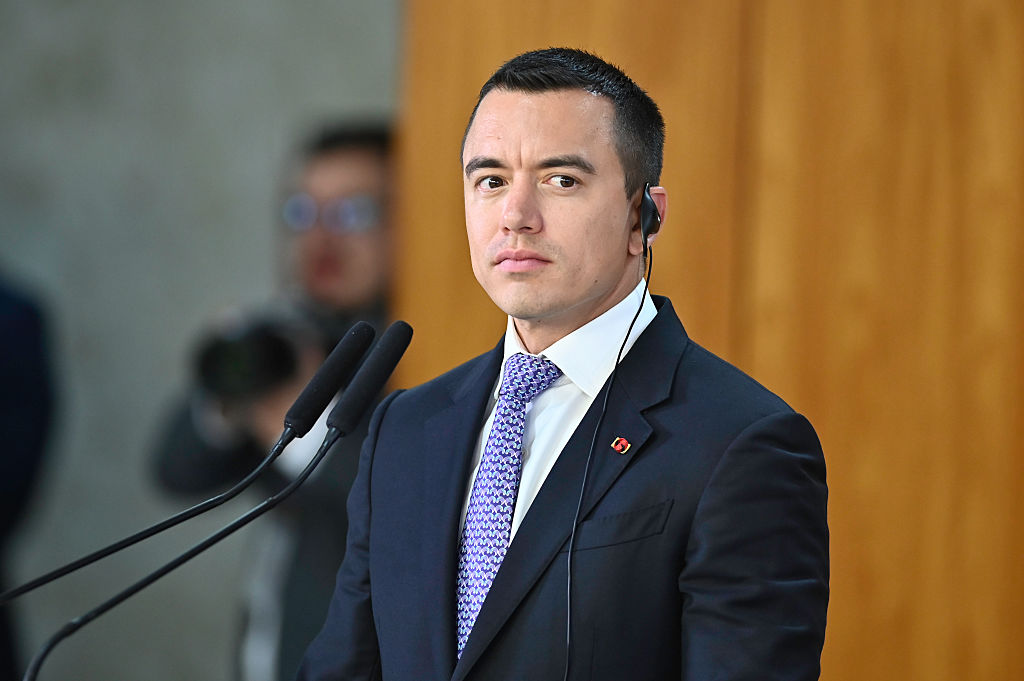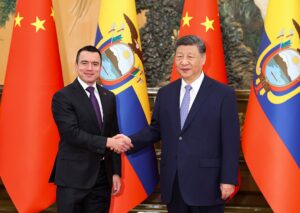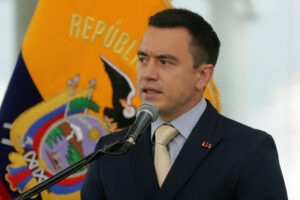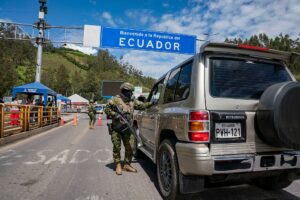Last month, President Daniel Noboa eliminated a popular, decades-old subsidy on diesel that was costing Ecuador’s cash-strapped government over $1 billion a year. Fuel prices jumped from $1.80 to $2.80 per gallon, and tensions seemed poised to boil over when the Confederation of Indigenous Nationalities of Ecuador (Conaie) declared a national strike to protest the measure.
Instead, protests were relatively muted. They were confined to a handful of northern Andean provinces, where the Indigenous movement is strongest, and caused minimal disruption in major cities. This marked a major contrast with 2019 and 2022, when the government was forced to withdraw fuel subsidy cuts after Conaie’s massive demonstrations paralyzed Quito. However, a string of violent incidents in recent days—including an attack on an aid convoy led by Noboa in Imbabura province on September 28—highlights the intensity of opposition in Conaie strongholds.
Far from backing down, Noboa has set his sights on changing the constitution. Critics claim he seeks to emulate Nayib Bukele, El Salvador’s president, who has won domestic popularity for his “mano dura” stance against organized crime. Still, given the opposition’s strength and other headwinds, Noboa likely lacks the political capital to remake the country’s institutions. Upcoming constitutional referendums on November 16 will indicate just how far his push for more power might go.
Carrots and sticks
To push through fuel subsidies, Noboa rolled out compensation and tax rebates for transport companies, farmers, fishermen, and low-income families to offset higher fuel costs. As Conaie leaders met in Cotopaxi to vote on whether to strike, Noboa appeared several kilometers away to deliver new tractors to farmers, promising to avoid disruptions to food supply.
Noboa also benefited from divisions within the Indigenous movement. Several regional bodies within Conaie split with national leadership to support Noboa’s reelection in April, and even in the Andean provinces, a large portion of the group’s more than 10,000 communities did not heed the call to take the streets—a marked contrast with 2019 and 2022.
But Noboa also took more draconian measures. The government declared a state of emergency in seven provinces even before Conaie called for a national strike and deployed the military to clear roadblocks. Noboa also pledged to prosecute violent protestors for terrorism under the controversial National Solidarity and Public Integrity law passed in June.
While Noboa continues to play up his security bona fides, his heavy-handed tactics have so far failed to curb violence. The widespread deployment of military units to combat gangs in January 2024 led to a reduction in homicides in the first half of the year, but did little to root out criminal groups’ entrenched presence in coastal provinces. A recent outbreak of violence in the prison system, where gangs have long operated with impunity, shows how military force and harsher punishments alone will not solve the issue.
Constitutional reform on the agenda
During his two years in office, Noboa has repeatedly sought to skirt institutional controls by claiming a popular mandate for his agenda. In April 2024, his government held a referendum on 11 issues, mostly related to his frontal assault on organized crime. That vote took place in a climate of widespread fear following a burst of brazen gang-related violence in January, and Ecuadorians endorsed his security-related proposals.
Now, Noboa is hoping that Ecuadorians grant him yet more leeway to take on organized crime and implement other reforms. Despite initial objections from the Constitutional Court, his administration successfully fought to organize a referendum on convening a Constituent Assembly. This elected body would propose more fundamental changes to the Magna Carta. The vote will take place on November 16, when the public will also decide whether to allow foreign military bases on national territory, and whether to eliminate public financing for political parties.
Through these measures, Noboa aims to weaken institutional checks on executive power that he increasingly views as obstacles to his security and economic agenda. After the Constitutional Court suspended security legislation in August, Noboa called for protests outside the Court in Quito and denounced the justices as “enemies of the people.”
The proposal to hold a Constituent Assembly has sparked fears that Noboa is following the playbook of Bukele, who has rewritten the law to co-opt the courts and allow for indefinite reelection. Noboa may harbor similar ambitions; he clearly hopes to weaken the Constitutional Court and the Council of Citizen Participation and Social Control, a body that appoints various oversight institutions.
No blank slate
However, voters are unlikely to give Noboa a blank slate to recast institutions. Despite recent momentum, his political capital is limited. His surprisingly large victory in April over Luisa González was as much a rejection of correísmo, the political movement of former President Rafael Correa, as an endorsement of Noboa’s agenda. Reflecting this, Noboa lost in the coastal provinces that have been at the center of his militarized anti-gang efforts since he took office in 2023.
His approval ratings—which recent polls place between 45% and 50%—are decent, given Ecuador’s security and economic challenges. But they are well below the levels needed to push through sweeping institutional change, judging by recent regional precedents. Bukele’s approval rating has approached 90% over the past year, and Andrés Manuel López Obrador, who pushed a profound remaking of Mexico’s judiciary, enjoyed support from over 60% throughout his six-year term.
Moreover, Noboa’s opponents are far from powerless. Despite its divisions, Conaie has the capacity to mobilize significant numbers of voters and will strongly oppose the upcoming referendum proposals. They will be joined by correísmo, which retains a loyal electoral base in major cities and, in alliance with the Total Renovation party, controls the largest bloc of seats in the National Assembly (67 of 151). Conaie remains at odds with correísmo due to the latter’s support for energy and mining projects and restrictions on civil liberties, which helps explain Noboa’s resounding victory in April. But the two coalitions may find common cause in opposing Noboa’s Constituent Assembly.
A defeat in November would not spell the end of Noboa’s ambitious agenda. Even if voters reject a Constituent Assembly, he will continue to push the boundaries of executive power and ignore institutional constraints when he can get away with it. He will persist in his aggressive fight against gangs, emboldened by growing support from the Trump administration, although this approach alone is unlikely to deliver major improvements in security.
Despite his penchant for political theater, Noboa will not turn the Ecuadorian state into a one-man show. Instead, he will most likely preserve solid governability—especially compared to the recent past—giving him the necessary leeway to implement at least part of his reform agenda.









